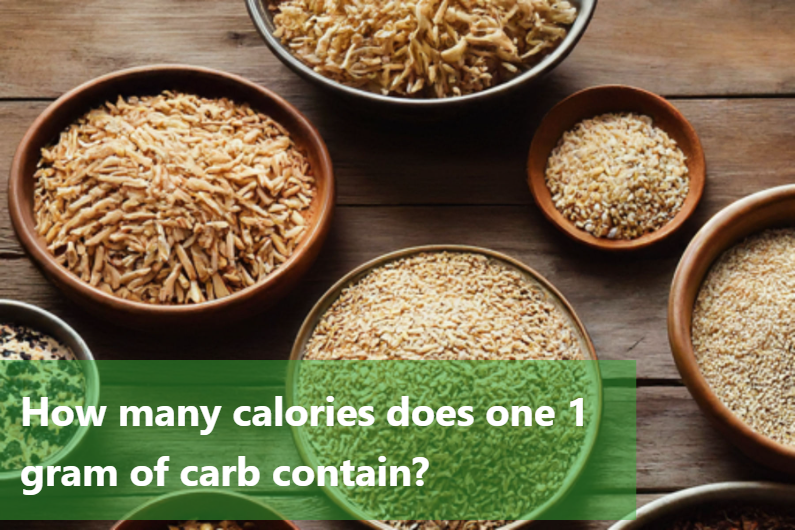
How many calories does one 1 gram of carb contain?
Carbohydrates - vital energy boosters for our body! These power-packed nutrients play a crucial role in fueling our every move. We are about to embark on an exhilarating journey into the realm of carbohydrates, unraveling their profound impact on our well-being.
Join us as we uncover the significance of carbohydrates and the pivotal role their calorie content plays in our day-to-day choices. Brace yourself for a remarkable exploration that will transform the way you perceive nutrition and pave the path toward a healthier, more vibrant lifestyle.

What Are Carbohydrates?
Primary Energy Source: Carbohydrates are a macronutrient found in foods like grains, fruits, vegetables, and dairy.
Chemical Composition: They consist of sugars, starches, and fibers made of carbon, hydrogen, and oxygen.
Energy Production: They provide energy for the body, with 4 calories per gram.
Types: Includes simple carbs (sugars) and complex carbs (starches and fibers).
Role in Health: Essential for brain function, energy metabolism, and digestive health.
Effects: Impact blood sugar levels, with different types having varying effects on health.
Quantifying calories in carbohydrate
Carbohydrates, also known as carbs, are an essential source of energy for the body.
Each gram of carbohydrates provides 4 calories. This information is crucial for individuals conscientious about their diet and weight.
Understanding the calorie content of carbohydrates is integral for anyone aiming to eat healthily and achieve specific health and fitness targets. It facilitates meal planning, portion control, and overall diet management. Whether the goal is weight loss, weight gain, or weight maintenance, being aware of carb calories is vital.
Keeping track of carb calories assists in ensuring sufficient nutrition intake and aligning carb consumption with energy and dietary requirements. For individuals with specific health and fitness goals, such as athletes or those managing conditions like diabetes, knowledge of the calorie content of carbohydrates is fundamental for devising appropriate meal and exercise plans.
This understanding plays a key role in decision-making related to food and nutrition, aiding in weight management, energy provision, and the attainment of specific health and fitness goals. Therefore, comprehending the calorie content of carbs empowers individuals to make informed choices for their overall health and well-being.
Factors affecting the calorie content of carbs
Type of Carbohydrate: Simple carbohydrates (sugars) and complex carbohydrates (starches and fibers) have different caloric densities.
Fiber Content: Fiber is a type of carbohydrate that the body cannot fully digest, so its caloric impact is lower than other carbohydrates.
Processing: Highly processed carbohydrates may have higher calorie content due to added sugars or fats.
Cooking Method: Cooking can break down carbohydrates, affecting their digestibility and thus their caloric availability.
Food Source: Carbohydrate content can vary between different foods and food groups.
Protein and Fat Content: Some carbohydrate-rich foods like nuts or dairy products also contain significant amounts of protein and fat, which affect overall caloric content.
Sugar Alcohols: Some carbohydrates, like sugar alcohols (found in sugar-free products), have a lower calorie content than traditional sugars.
Understanding these factors is crucial for making informed dietary choices and managing calorie intake effectively. By being mindful of fiber content, opting for less processed varieties, and choosing healthier cooking methods, individuals can better control their calorie consumption from carbohydrates, contributing to overall health and well-being.

Carbohydrate Calorie Breakdown
Recognizing the impact of carbohydrate calorie content is an integral part of a holistic approach to wellness, enabling individuals to make mindful, informed decisions that support their overall health and well-being.
Understanding the calorie content of carbohydrates empowers individuals to take control of their nutrition, allowing for a balanced approach to consuming carbs and ensuring that they contribute to a healthy diet rather than being a source of excess empty calories.
It plays a crucial role in our diet and is essential for managing weight, fueling the body for physical activity, and promoting overall well-being.
FAQs
-
How many calories are in one gram of carbohydrate?
One gram of carbohydrate contains 4 calories.
-
Why are carbohydrates a source of energy?
Carbohydrates are a quick source of energy because they provide 4 calories per gram when metabolized.
-
How do carbohydrates impact weight gain or loss?
Consuming excess carbohydrates can lead to weight gain as they are stored as fat if not used for energy. To lose weight, balancing carbohydrate intake with exercise is recommended.
-
What are some examples of high-carb foods?
High-carb foods include grains, fruits, vegetables, and sugary snacks.
-
Is it necessary to count carbohydrates for a healthy diet?
While moderation is key, keeping track of carbohydrate intake can be helpful for individuals managing their weight or blood sugar levels.
This Blog post is an initiative by Lo! Foods, to provide accurate and Nutritionist / Doctor approved information related to Health. Lo! Foods is India's leading brand for Everyday Functional Foods. Foods designed for specific Health conditions or Needs. Lo! Foods also runs India's largest range of Low Carb Healthy Cloud Kitchens, under the brand names of Lo!, ProteinChef, ATH (All Things Healthy) and DiabeSmart.













Leave a comment
Your email address will not be published.